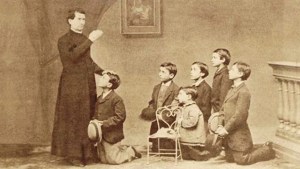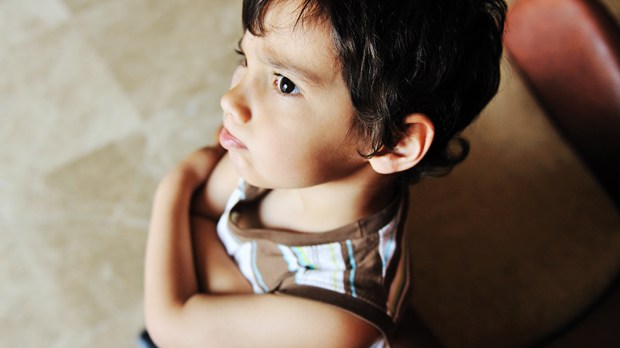Edie, my three-year old daughter, and I were recently playing a highly competitive game of Connect-Four — which she always wins because she amends the rules as the game proceeds — when she suddenly picked up the game and walked away. I demanded she return because I was finally winning for once and it’s no fair to quit mid-game, but she explained to me that she would not be returning because she wanted to “play over here now by myself.” She felt no guilt whatsoever. In fact, it never entered her mind that my feelings would be hurt by being abandoned. All I could do was laugh. After all, oblivious self-centeredness is fairly typical toddler behavior.
My wife and I have five children, and there are days when our house becomes a war zone as tussles flare up over who owns what toy, who stole what from whom, and who is currently aggrieved over time-share arrangements with electronics. As a parent, my patience wears thin at times. With the younger children it isn’t too worrying, since an egocentric developmental stage is fairly standard, but I fervently hope they’ll grow out of it as they mature. If I end up with self-centered teenagers or young adults on my hands, will I have failed as a parent?
What concerns me is that I cannot force them to become generous, thoughtful people. I cannot discipline them out of self-centeredness. Sure, I can make them share toys and punish them when they’re selfish, but I can’t get them to do what I want forever. Eventually, they’ll be grown up and make their own choices.
St. John Bosco understands our parental predicament. As a celibate priest living in Italy in the 19th century, he didn’t technically have children of his own, but his entire life was dedicated to essentially being a surrogate father for orphans. He would often have 500 boys at a time under his care, whom he prepared for First Communion, educated, fed, housed, and trained for jobs. Before coming to the orphanage, these boys were often part of unruly street gangs who wandered the streets. They were self-centered, thieving, and even violent young men. The boys didn’t know how to give or receive love and their lives were centered around taking care of themselves. If they didn’t, they would starve.
No one wanted to take responsibility for them — no one except John Bosco, that is. He saw their potential. By becoming their surrogate father and using a specific educational philosophy, he brought out the best in them. In the end, many of his young students grew up to be so selfless that they themselves became priests and dedicated themselves to joining Bosco in his work.
John Bosco’s parenting style was simple and he himself summarizes it in three points. “The system,” he says, “is based entirely on reason, religion, and kindness.”
Reason
When he was young, Bosco found his teachers distant. It was difficult to ask their advice, so he vowed that he would always have an open door policy. Any child was encouraged to ask questions or seek advice at any time. Because of this, the environment in his orphanage was supportive, not repressive. He would remain in the daily company of the children and help them understand the rules, often offering guidance to head off any infractions before they happened. By doing this, he seldom had to punish the children and instead gained their trust through teaching them the reasons for the rules.
Children need space to argue and question, even if they’re questioning the rules or arguing from a self-centered motivation. It’s a good sign when they do so. It means they’re thinking deeply, developing their reasoning skills, and beginning to see the world from a wider perspective.
Religion
John Bosco introduced the Catholic faith in its entirety as a core component of his parenting style. One of the reasons he believed it was so important, though, can be summarized for almost anyone even if you’re a parent who isn’t Catholic or even very religious. He taught the children the beauty of virtue. Virtue is an inner reality that each of us develops, leading to happiness through good, selfless actions.
As parents, we can’t rely entirely on negative consequences to teach our children. We might be able to temporarily punish them into behaving in a selfless manner, but if they don’t change on the inside they may still be self-centered. By modeling virtue for our children and treating them gently, we will win their hearts and they’ll begin to think of others and practice virtue all on their own.
Kindness
Bosco would say, “Let us make ourselves loved, and we shall possess their hearts.” His parenting style was always to spend time with the children. He played their games, called them friends, and gave them responsibility to show his trust. This is how he became the father of every rascal and vagrant in town. His kindness won them over.
When we are kind to our children, they know that even when we punish them it’s because we love them. When we allow them to play, make a mess, and make mistakes always knowing they’ll never lose our kindness, they’re able to internalize the very lessons we hope they will learn. The kindness of a parent goes straight to a child’s heart, and once children know they’re loved and supported no matter what, they’ll have the confidence to develop the inner resources needed to open up their hearts to the world.

Read more:
7 Saintly tips on how to discipline a child, from Don Bosco

